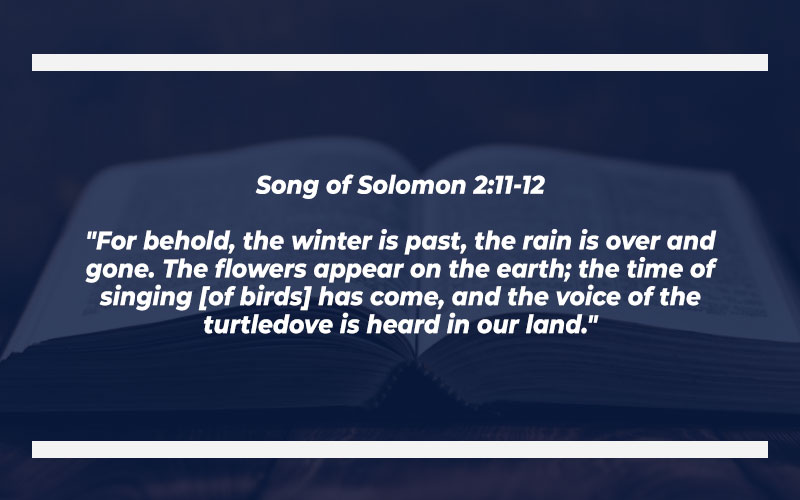Spring is a beautiful season of renewal and growth. It is a time when nature awakens from its winter slumber, bringing forth vibrant flowers, green leaves, and new life. In the Bible, spring is often associated with new beginnings, hope, and the faithfulness of God in bringing life and abundance. Let’s explore some powerful verses about Spring.
Bible Verses About Spring
Song of Solomon 2:11-12
“For behold, the winter is past, the rain is over and gone. The flowers appear on the earth; the time of singing [of birds] has come, and the voice of the turtledove is heard in our land.”

Commentary: This verse captures the essence of spring as a season of renewal and joy. The transition from winter to spring symbolizes the end of a difficult period and the beginning of a time filled with beauty and new life. It reminds us that after every season of hardship, God brings a season of growth and celebration.
Isaiah 35:1-2
“The wilderness and the dry land shall be glad; the desert shall rejoice and blossom like the crocus. It shall blossom abundantly and rejoice with joy and singing. The glory of Lebanon shall be given to it, the majesty of Carmel and Sharon. They shall see the glory of the Lord, the majesty of our God.”
Commentary: Isaiah speaks of the transformation of desolate places into flourishing landscapes, reflecting God’s power to bring life and beauty out of barrenness. This prophecy not only foretells physical renewal but also spiritual revival, as people witness the glory and majesty of God.
Joel 2:23
“Be glad then, you children of Zion, and rejoice in the Lord your God; for He has given you the early rain in just measure, and He has brought down for you the rain, the early and the latter rain as before.”
Commentary: This verse emphasizes God’s provision through the seasons, particularly through the rain that nurtures the land. The “early and the latter rain” signify God’s faithfulness in providing for our needs at the right time, ensuring growth and harvest. It encourages believers to trust in God’s timing and provision.
Hosea 6:3
“So let us know and become personally acquainted with Him; let us press on to know and understand fully the [greatness of the] Lord [to honor, heed, and deeply cherish Him]. His appearing is prepared and is as certain as the dawn, and He will come to us [in salvation] like the [heavy] rain, like the spring rain watering the earth.”
Commentary: Hosea likens God’s coming to the certainty and refreshment of spring rains. Just as the rain brings life and renewal to the earth, God’s presence brings spiritual renewal and growth. It calls us to seek a deeper relationship with God, knowing that His arrival brings restoration and blessings.
James 5:7
“So wait patiently, brothers and sisters, until the coming of the Lord. The farmer waits expectantly for the precious harvest from the land, being patient about it until it receives the early and late rains.”
Commentary: James encourages believers to be patient and steadfast, drawing a parallel with a farmer waiting for the harvest. The mention of early and late rains highlights the importance of both initial and ongoing sustenance. This patience is a metaphor for awaiting the Lord’s return, trusting in His perfect timing and provision.
Psalm 65:9-10
“You visit the earth and make it overflow [with water]; You greatly enrich it; the stream of God is full of water; You provide their grain, for so You have prepared the earth. You water its furrows abundantly, You smooth its ridges; You soften it with showers, You bless its growth.”
Commentary: This psalm celebrates God’s abundant provision and care for the earth. The imagery of watering and enriching the land signifies God’s role in sustaining life and promoting growth. It reminds us of His continuous blessings and the importance of recognizing and thanking Him for His provision.
Jeremiah 5:24
“They do not say in their heart, ‘Let us now fear and worship the Lord our God [with profound awe and reverence], Who gives rain in its season, both the autumn rain and the spring rain, Who keeps for us the appointed weeks of the harvest.’
Commentary: Jeremiah highlights the failure of people to acknowledge God’s provision. The verse calls us to revere and worship God, recognizing Him as the source of seasonal rains that are crucial for harvest. It serves as a reminder to attribute our sustenance and success to God’s faithful provision.
Job 29:23
“And they waited for me as for the rain, and they opened their mouth as for the spring rain.”
Commentary: Job reflects on the time when people eagerly anticipated his words, comparing it to the anticipation of spring rain. This metaphor illustrates the value and life-giving quality of wise and righteous counsel. It emphasizes the importance of wisdom and the positive impact it has on others, much like how rain nourishes the earth.
Proverbs 16:15
“In the light of the king’s face is life, and his favor is like a cloud bringing the spring rain.”
Commentary: This proverb equates the favor of a king to the life-giving spring rain. It suggests that just as rain is essential for growth and vitality, so is the favor and approval of those in authority. This analogy underscores the importance of seeking and valuing righteous leadership and guidance.
Zechariah 10:1
“Ask for rain from the Lord at the time of the spring rain. It is the Lord who makes the thunderclouds; and He will give them showers of rain, grass in the field to everyone.”
Commentary: Zechariah encourages the people to seek God for their needs, particularly for rain which symbolizes provision and blessing. By attributing the rain to God, the verse emphasizes His sovereignty and willingness to bless His people. It calls us to trust and depend on God for our sustenance.
Deuteronomy 11:14
“Then He will give the rain for your land in its season, the early [fall] rain and the late [spring] rain, so that you may gather in your grain and your new wine and your olive oil.”
Commentary: This promise from Deuteronomy assures that God will provide the necessary rain for crops at the right times. The early and late rains are crucial for a successful harvest, symbolizing God’s provision and timing. It encourages reliance on God for all needs and gratitude for His blessings.
Psalm 104:13
“He waters the mountains from His upper chambers; the earth is satisfied and abounds with the fruit of His works.”
Commentary: This psalm highlights God’s control over nature and His provision for the earth. By watering the mountains, God ensures that the earth produces abundant fruit. It reflects God’s care for His creation and His ability to sustain and nourish all life through His works.
Matthew 5:45
“So that you may show yourselves to be the children of your Father who is in heaven; for He makes His sun rise on those who are evil and on those who are good, and makes the rain fall on the righteous and the unrighteous [alike].”
Commentary: Jesus teaches about God’s impartial provision, where the sun and rain are given to all people regardless of their righteousness. This verse emphasizes God’s grace and mercy, calling us to reflect His love and kindness to others without discrimination.
Luke 12:27-28
“Consider the lilies, how they grow: they neither labor nor spin [wool to make clothing]; yet I tell you, not even Solomon in all his glory clothed himself like one of these. But if this is how God clothes the grass which is in the field today and tomorrow is thrown into the furnace, how much more will He clothe you? You of little faith!”
Commentary: Jesus uses the lilies as an example of God’s provision and care for His creation. If God so beautifully clothes the grass, how much more will He provide for us? This passage encourages trust in God’s provision and challenges us to have faith in His care for our needs.
John 12:24
“I assure you and most solemnly say to you, unless a grain of wheat falls into the earth and dies, it remains alone [just one grain, never more]. But if it dies, it produces much grain and yields a harvest.”
Commentary: Jesus speaks of the necessity of death for producing new life, using the metaphor of a grain of wheat. This principle applies to spiritual growth, where dying to self leads to a fruitful life in Christ. It emphasizes sacrifice and transformation as pathways to abundant life.
Isaiah 55:10-11
“For as the rain and snow come down from heaven, and do not return there without watering the earth, making it bare and sprout, and providing seed to the sower and bread to the eater, so will My word be which goes out of My mouth; it will not return to Me void (useless, without result), without accomplishing what I desire, and without succeeding in the matter for which I sent it.”
Commentary: This passage draws a parallel between the effectiveness of rain and God’s word. Just as rain nurtures the earth to produce crops, God’s word accomplishes His purposes. It assures us of the power and certainty of God’s promises, encouraging us to trust in His word.
Genesis 8:22
“While the earth remains, seedtime and harvest, cold and heat, winter and summer, and day and night shall not cease.”
Commentary: After the flood, God establishes the regularity of seasons and natural cycles. This promise of continuity reflects God’s faithfulness and the stability of His creation. It reassures us of His ongoing provision and the order He maintains in the world.
2 Corinthians 9:10
“Now He who provides seed for the sower and bread for food will provide and multiply your seed for sowing and increase the harvest of your righteousness.”
Commentary: Paul speaks of God’s provision not only in physical needs but also in spiritual growth. God supplies and multiplies resources, leading to a fruitful harvest of righteousness. This verse encourages generosity and trust in God’s ability to provide abundantly.
Psalm 147:8
“Who covers the heavens with clouds, Who provides rain for the earth, Who makes grass grow on the mountains.”
Commentary: This psalm praises God’s control over nature, highlighting His provision of rain and the resulting growth. It reminds us of God’s sovereignty and His active role in sustaining the world. Recognizing God’s hand in nature encourages gratitude and worship.
Amos 9:13
“Behold, the days are coming,” says the Lord, “When the plowman shall overtake the one who gathers the harvest, and the one who treads the grapes shall overtake him who sows the seed; for the mountains shall drip sweet wine, and all the hills shall melt [that is, everything that was once barren will overflow with streams of blessing].”
Commentary: Amos prophesies a time of unprecedented abundance and blessing. The rapid succession of planting and harvesting symbolizes overwhelming prosperity. This promise of restoration and blessing encourages hope and faith in God’s ability to transform and bless our circumstances.
Proverbs 3:9-10
“Honor the Lord with your wealth and with the first fruits of all your crops (income); then your barns will be abundantly filled and your vats will overflow with new wine.”
Commentary: This proverb teaches the principle of honoring God with our resources. By giving the first and best of our income, we acknowledge His provision and lordship. The promise of abundant blessings in return encourages generous and faithful stewardship.
Leviticus 26:4
“Then I will give you rain in its season, and the land will yield her produce and the trees of the field bear their fruit.”
Commentary: God promises to bless His people with timely rain, ensuring a fruitful harvest. This verse highlights the connection between obedience and God’s provision. It reassures us of God’s commitment to bless and sustain us when we follow His commands.
Acts 14:17
“Yet He did not leave Himself without some witness [as evidence of Himself], in that He kept constantly doing good things and showing you kindness and giving you rains from heaven and productive seasons, filling your hearts with food and happiness.”
Commentary: Paul speaks of God’s continuous goodness and kindness, evidenced by His provision of rain and fruitful seasons. This testimony of God’s care and generosity fills our hearts with gratitude and joy. It reminds us that God’s blessings are constant and abundant.
Psalm 1:3
“And he will be like a tree firmly planted [and fed] by streams of water, which yields its fruit in its season; its leaf does not wither; and in whatever he does, he prospers.”
Commentary: This psalm compares a righteous person to a well-watered tree, flourishing and fruitful. The imagery of streams of water represents God’s provision and sustenance. It encourages us to stay rooted in God’s word and presence, ensuring a prosperous and fruitful life.
John 15:5
“I am the Vine; you are the branches. The one who remains in Me and I in him bears much fruit, for [otherwise] apart from Me [that is, cut off from vital union with Me] you can do nothing.”
Commentary: Jesus emphasizes the importance of remaining connected to Him for a fruitful life. Just as branches cannot bear fruit without the vine, we cannot achieve spiritual growth and productivity without abiding in Christ. It underscores our dependence on Him for all aspects of life.
Galatians 6:9
“Let us not grow weary or become discouraged in doing good, for at the proper time we will reap, if we do not give in.”

Commentary: Paul encourages perseverance in doing good, promising a harvest in due time. The analogy of reaping emphasizes the reward of sustained effort and faithfulness. It motivates us to continue in righteous deeds, trusting that God will bring about a fruitful outcome.
Psalm 126:5-6
“Those who sow in tears shall reap with joyful shouting. He who goes back and forth weeping, carrying his bag of seed [for planting], will indeed come again with a shout of joy, bringing his sheaves with him.”
Commentary: This psalm speaks to the principle of sowing and reaping, particularly in difficult times. It assures that those who endure hardship while sowing will eventually experience joy and a bountiful harvest. It encourages hope and perseverance, knowing that God will reward faithful labor.
James 3:18
“And the seed whose fruit is righteousness (spiritual maturity) is sown in peace by those who make peace.”
Commentary: James highlights the relationship between peacemaking and righteousness. The seeds of righteousness are sown in an environment of peace, leading to spiritual maturity. This verse calls us to be peacemakers, fostering an atmosphere where righteousness can flourish.
Matthew 13:23
“And the one on whom seed was sown on the good soil, this is the one who hears the word and understands and grasps it; he indeed bears fruit and yields, some a hundred times as much as was sown, some sixty [times as much], and some thirty.”
Commentary: Jesus explains the parable of the sower, emphasizing the importance of receiving and understanding God’s word. The good soil represents a receptive heart that bears abundant fruit. It encourages us to cultivate our hearts, allowing God’s word to take root and produce a fruitful life.
1 Corinthians 3:6-7
“I planted, Apollos watered, but God [all the while] was causing the growth. So neither is the one who plants nor the one who waters anything, but [only] God who causes the growth.”
Commentary: Paul highlights the roles of different individuals in God’s work while emphasizing that it is ultimately God who brings growth. This passage reminds us of our dependence on God for spiritual growth and the importance of giving Him the glory for any increase. It encourages humility and recognition of God’s sovereignty in all things.
2 Peter 3:18
“But grow [spiritually mature] in the grace and knowledge of our Lord and Savior Jesus Christ. To Him be glory (honor, majesty, splendor), both now and to the day of eternity. Amen.”
Commentary: Peter exhorts believers to continue growing in their relationship with Christ. Spiritual maturity involves increasing in grace and knowledge, reflecting the character of Jesus. This growth brings glory to God, both now and eternally. It challenges us to pursue continual growth in our faith and understanding of Christ.
What Does the Bible Say About Spring
Spring is a beautiful season, full of life and renewal, and it can remind us of many teachings from the Bible. In the Bible, spring is often seen as a time of new beginnings and hope, much like how the earth comes back to life after the cold winter. The flowers bloom, the trees grow new leaves, and everything looks fresh and green, which can symbolize the new life and hope that God gives us.
The Bible tells us that just as the earth brings forth plants and flowers in spring, God brings new life to our hearts and souls. Spring can be a time to think about God’s promises and how He renews our spirits. When we see the new growth and the beauty of the season, it can remind us of God’s love and His power to bring good things into our lives.
In the same way that farmers plant seeds in the spring and look forward to a harvest, we can plant seeds of faith and kindness in our hearts and in the lives of others. These seeds can grow and bring forth good things, just as the plants grow and produce fruit. Spring can also remind us to be patient and trust in God’s timing, because just as the seeds take time to grow, the good things God has planned for us also take time.
Spring is also a time for cleaning and getting rid of the old to make way for the new. This can be a reminder for us to clean out the old things in our lives that are not good or helpful, and to make room for new, better things that God wants to give us. Overall, spring is a wonderful time to reflect on God’s goodness and to thank Him for the new life and hope He brings to us. It can be a season of renewal and growth, both in nature and in our hearts.






Bible Commentary, Blog
50 Important bible verses on identity (With Explanation)